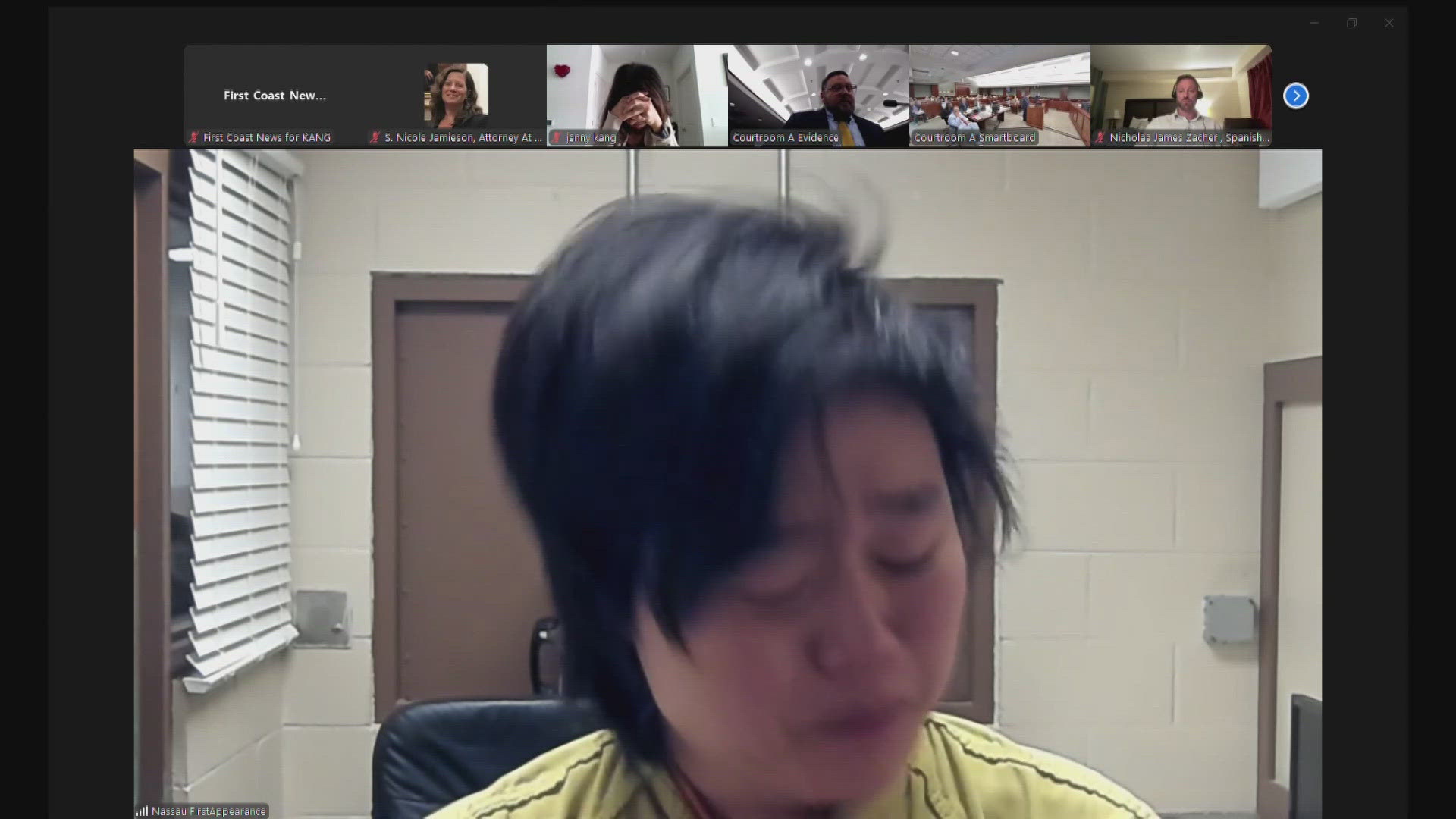JACKSONVILLE, Fla. -- Public Defender Matt Shirk is calling for an investigation into the Jacksonville Sheriff's Office's handling of a case in which a man spent 589 days in jail for a crime he didn't commit.
Jerome Hayes was the subject of a joint First Coast News/Florida Times-Union investigation in August.
Arrested in 2013 for three related armed robberies, Hayes swiftly presented an alibi for two of the three crimes. He told detectives his younger brother, whom he resembled, was the likely perpetrator, and emails show that detectives and prosecutors thought so too.
Yet Hayes remained in jail a total of 19 months – losing two jobs, his relationship with his girlfriend, and missing the birth of his first child.
In addition to the length of Hayes' detention, the case raised concerns about missing evidence, including an interview JSO conducted with his brother. Hayes' public defender was never told about the interview. And when he specifically requested a copy of the DVD recording, he was told it didn't exist.
In his letter, Matt Shirk asks JSO Director of Investigations and Homeland Security Michael Bruno to review what he called "troubling" elements of the case.
In a written statement, Bruno said has already reviewed the case as a result of media inquiries, but in light of the Public Defender's request, he will "forward the matter to Internal Affairs for formal review."
The Public Defender's full letter and JSO statement are below.
Statement by Michael Bruno, Director of Investigations and Homeland Security:
"I have received a letter from the Public Defender alleging wrongdoing by two of our detectives during a JSO investigation. This case has received a thorough review by me, as a direct result of media inquiries. As I mentioned in both of those interviews, I addressed the allegations and found no misconduct by the officers. However, in light of the letter I received today, and new allegations by Mr. Shirk, I will look at those specific (new) allegations and forward the matter to Internal Affairs for formal review."
Letter from Matt Shirk:
September 18, 2015
Mr. Mike Bruno
Director of Investigations and Homeland Security
Jacksonville Sheriff's Office
501 East Bay Street
Jacksonville, FL 32202
RE: Jerome Hayes, 16-2013-CF-2593-AXXX-MA
Detective G.L. Medlock
Detective C.C. Waters
Dear Director Bruno:
The intent of this letter is to bring certain matters to your attention concerning the handling of the investigations that led to the arrest of Mr. Jerome Hayes for three armed robberies. The Public Defender's Office (PDO, hereafter) respectfully requests that the Jacksonville Sheriff's Office (JSO, hereafter) conduct an internal investigation to determine whether any JSO policies were violated during the course of the investigation and whether the investigators assigned to these cases embodied JSO's "Core Value" of "Always Improving."
The three investigations conducted by JSO are documented under CCR numbers 2012-890425 (the December 9th, 2012 robbery), 2012-916013 (the December 20th, 2012 robbery) and 2013-105514 (the February 12th, 2013 robbery). Detective G.L. Medlock (the December 20th, 2012 robbery) and Detective C.C. Waters (December 9th, 2012 and February 12th, 2013 robberies) were the lead detectives and worked in unison on these cases.
Rather than attempt to provide a chronological summary of the investigation, the issues listed below concern the PDO the most. It is recommended that the investigating detective review Topher Sanders' lengthy article in the Florida Times-Union concerning Jerome Hayes' case in order to provide context to the issues listed below (article enclosed). The issues below are those identified by the PDO as being the most troubling, in no particular order.
1.Failure to identify or interview a potential witness- During patrol's initial investigation of the December 20th, 2012 robbery, the responding officer, Officer D.B. Cooper, #61123, noted in the general incident report that the victim of the robbery, Mr. Mark Henshaw, believed the robber spoke with a "black male that appeared to be cleaning out apartment #408" immediately before the robbery. Despite this information being contained in the general incident report, no efforts were made by the lead detective (Det. Medlock) to attempt to identify this individual. Since the only evidence gathered by JSO indicating the Jerome was the perpetrator of the robbery was a single photospread identification by Mr. Henshaw, failure to investigate a witness who could identify the robber is particularly concerning.
2.Failure to properly document analytical work performed by the Crime Analysis Unit- Prominently mentioned in both Det. Medlock's and Det. Water's supplemental reports, the Crime Analysis Unit identified Jerome Hayes as a potential suspect (also referred to as a "person of interest" and as "the target," by Det. Medlock) in the robbery investigations. How Jerome Hayes was identified as a potential suspect by the Crime Analysis Unit is not documented in any report obtained by the PDO (or obtained by the Times-Union in their public records request). The analyst who performed this work is not identified in any report obtained by the PDO. The sources of information relied upon by the Crime Analysis Unit is not documented in any report obtained by the PDO. Also troubling is the fact that neither Det. Medlock nor Det. Waters could articulate in a sworn deposition what information led the Sheriff's Office to conclude that Jerome was the 'primary' target of the investigation. The decision to include Jerome in the photospreads is quite possibly the most important decision made during the course of the investigation. The complete absence of any explanation as to why Jerome was considered the 'target' of the investigation seriously undermines the reliability and integrity of the investigation and, thus, its results.
3.Failure to Submit Jermaurice Hayes's Photospread to Property- During the investigation of these robberies, a photospread containing Jermaurice Hayes's picture was created and shown to a witness (in the February 12th, 2013 robbery). The witness failed to identify anyone from this photospread. This photospread was never submitted to JSO's property room. During the PDO's handling of this case, multiple requests were made to the State Attorney's Office for a copy of this photospread. The PDO was informed at one point by the State Attorney's Office that this photospread no longer existed. The photospread was located in the detective's file. Had the photospread been properly submitted to the property room, it is believed that this confusion of its existence would not have occurred.
4. Failure to properly document investigative actions (work records) - Approximately seven weeks after Jerome Hayes was arrested; Det. Medlock performed follow up investigation (believed to have been done at the request of the State Attorney's Office). This investigation consisted, in part, of traveling to Jerome's place of employment (Steak and Shake on San Jose Boulevard) and gathering Jerome's work records. These work records confirmed that Jerome was at work at the time of the commission of two of the robberies (the December 9th, 2013 robbery and the February 12th, 2014 robbery). Det. Medlock obtained print outs of the employee work records and spoke with at least one manager in an effort to investigate Jerome's alibi. These work records were never submitted to the property room and no report was generated to document these investigative activities.
5.Failure to properly document investigative actions (interview of Jermaurice Hayes)- In August of 2013, approximately five months after Jerome's arrest, Det. Medlock conducted a recorded interview of Jermaurice Hayes, Jerome's younger brother. The fact that this interview was conducted is not documented in any supplemental report. While emails between Det. Medlock and Assistant State Attorney Erin Wolfson (the ASA assigned to Jerome's cases at the time) show that Det. Medlock informed ASA Wolfson that this interview took place, a copy of the interview was not disseminated to the State Attorney's Office, in apparent violation of JSO Operational Order 18.02.22(VII)(B)(9). The failure to document this interview and failure to disseminate the recording to the SAO is believed to have led to ASA Overstreet (the ASA who took the case over from ASA Wolfson) being unaware that this interview took place and his misstatement to the PDO concerning the existence of this recording.
6.Issues Concerning Electronic Surveillance Efforts- The PDO learned during the discovery process that Det. Medlock applied for and received judicial permission to conduct electronic surveillance (a Pen Register, Trap and Trace and geolocation) on a cell phone believed to be used by Jerome Hayes. This was applied for after an arrest warrant for Jerome Hayes had been issued and JSO and/or other law enforcement agencies were actively searching for Jerome. This electronic surveillance is not documented in any report obtained by the PDO. When questioned concerning this electronic surveillance, Det. Medlock testified under oath that he was unaware whether this surveillance was ever actually conducted.[1] Det. Medlock was the affiant on the application for electronic surveillance and swore under oath that the contents of the application were true and correct. In deposition, however, Det. Medlock testified that he was unaware of the source of the information contained in the application, deferring all questions to Det. Waters (deposition of Medlock and Waters enclosed). Specifically, Det. Medlock could not explain how the cell phone that was to be tracked was connected with Jerome. While it can be entirely appropriate for a law enforcement officer to rely upon the information possessed by fellow officers, such information needs to be properly attributed in investigative reports (and especially in sworn documents), so as not to possibly mislead any reviewing magistrate.
My office is entirely willing to cooperate with any investigation into the above described issues. You may contact me at 904-255-4600 and I will make myself available to assist in any way. Assistant Public Defender James Boyle was lead counsel for Jerome Hayes from June of 2014 to when all charges were dropped in November 2014. He can be reached at (904) 255-4620 or via email at jboyle@pd4.coj.net. He is most familiar with these cases and the issues described above and will make himself available to you.
It is our hope that JSO can learn from the mistakes made in Jerome's case so as to minimize the possibility of this occurring in the future. To that end, I am certain that we are of the same mind. The decision to make this complaint was not taken lightly. I firmly believe that we are liberty's last champion. It is our solemn duty to support, protect and defend the Constitution, and it is in this spirit that I write to you today.
Sincerely,
Matthew Shirk
Public Defender
MAS/ps
Enclosure(s)
cc: The Honorable Mike Williams, Sheriff
The Honorable Angela Corey, State Attorney
Tom Fallis, Esquire
Jerome Hayes
[1] Florida Statute section 934.33(6)(a) states that law enforcement, when conducting electronic surveillance in certain circumstances, is required to maintain certain records concerning the surveillance activities. It is unknown whether this statute was complied with in this instance, as the PDO has no knowledge of whether such records were maintained or even whether any actual surveillance was performed.


